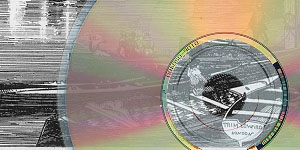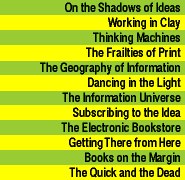


The Information Universe
The Xerox Corporation estimates that two thousand million pages are currently copied every day worldwide. Fast and portable color copiers are now so cheap that enforceable copyright is rapidly becoming a thing of the past. Publishers can sue big photocopy stores, but they can't sue half a million homeowners. And the copying problem can only grow worse. Copiers armed with capacious electronic memories are getting smaller and cheaper and faster year by year.But the copying problem simply explodes as books go electronic. Copying electronic information is easier, cheaper, and faster than copying paper and can be done without human labor. When books are electronic, even if they are encrypted, at some point they must be decrypted for the user to read. At that point they can be copied. Perfectly. Further, the cost of that copy, which is equal to the cost of the memory needed to hold it, is quickly approaching zero. Even if publishers try to avoid electronic copying by staying with paper, readers could electronically scan their paper books, then copy the electronic copy. It will merely take longer to make the first copy. So if books continue to be priced much higher than the cost of copying them, publishers and authors will inevitably lose serious money to pirates. Which will harm all of us.
Information isn't the same as tangible goods. It can be copied almost instantly over enormous distances, leaving no trace of the copier and suffering no loss in fidelity. When a few million of us have the means of duplication in our hands, copyright may still exist as a legal idea, but it will be unenforceable between publishers and the public. Today, no one is arrested for privately copying and sharing audio, video, and computer tapes and disks, even though that practice has never been tested in court. So, to survive, publishers will probably have to make book buying roughly as cheap and as convenient as book copying.
If that sounds ridiculous, then perhaps you're thinking of a book as a physical object that costs a lot to make and distribute new copies. But with electronic books the cost is in the production of the book, not in its reproduction and dissemination. Compared to paper, copying and transmitting electronic information is essentially free to the publisher. If publishers try to charge high per-copy prices, some customers may use the same technology to make their own essentially free copies. So the publishing system must change.
Yet, if authors and publishers can't protect their books, they can't possibly profit. If they can't profit, how will new books get made? To find the answer to that particular puzzle let's suppose we live in a universe where there is a magic machine that can copy anything---a book, a chair, a computer--- quickly and cheaply. We could buy a sofa, some sandwiches, and some silverware, then copy them at home. The food, forks, and furniture markets would then evaporate. In essence, that's the universe of information. In that universe it's as easy to copy something as it is to produce it. All the cost lies in the design, not in the manufacture or reproduction. It would then be foolish to try to sell food, but we could still sell recipes and---more to the point---the rights to future delicious recipes.